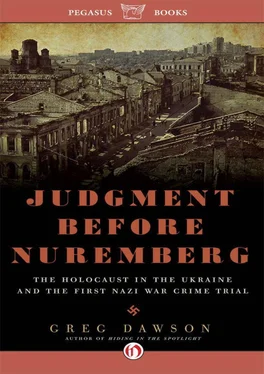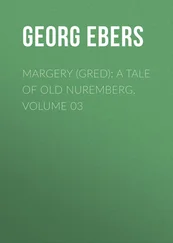But then, how much is a character reference from a fellow mass murderer really worth? In the months leading up to the execution of the convicted killers, there had been a flurry of petitions requesting clemency for the many defendants at Nuremberg. No one petitioned on behalf of Blobel. Americans concluded he was “friendless.”
Blobel and four other Einsatz commanders were hanged at Landsberg prison near Munich on June 7, 1951. He was in good company, if not among friends.
Ours is a curious age of narcissism and self-flagellation, an excuse culture of exhibitionists in which the high priests—Oprah and Dr. Phil—invite us to advertise our sins and remorse in the klieg lights of their studio confessionals. The essence of this public ethos is found in words not coined but made famous by the Rev. Oprah: “Denial is not just a river in Egypt.”
With our supreme self-absorption comes historical myopia. We think we invented denial. This same vanity, crossed with savvy marketing and contempt for history, produced the ludicrous notion of a “greatest generation”—and a bestseller for Tom Brokaw. With a straight face, Brokaw suggested that the soldiers who fought in World War II represented a generation of Americans somehow superior to those who stood with Washington at Valley Forge, with Lee and Grant in Virginia, nobler than the doughboys who died in Flanders fields—worthier than the generation of Americans who marched with King, were beaten and jailed for registering voters in the South, and gave lives and limbs to a misbegotten task in Vietnam.
That is some pretty audacious nonsense, but Brokaw and other contemporary peddlers of altered reality must bow before the perpetrators of the Holocaust—the architects and true masters of denial. Hitler’s Thousand-Year Reich lasted only twelve years. He dreamed of a “Garden of Eden” in the East, free of Jews, and left a desert littered with skulls. The Führer also left behind accomplices—from the high command in Berlin to distant command posts in Ukraine—who in courtrooms in Kharkov and Nuremberg produced the greatest exercise in collective denial ever recorded.
The Nazi killers were nothing if not creative. Their denial was expressed to different degrees, on a variety of levels, from simple denial of documented physical facts to tortured denial of legal principle and philosophical truth.
For example, at one darkly comic extreme—the Sgt. Schultz “I know nothing ” position—was Walter Haensch, an Einsatzgruppe commander who claimed that he first learned of the mass murder of Jews in 1947 when he was told by an interrogator at Nuremberg. Never mind that the Einsatzgruppe’s own field reports placed Haensch at sites in Russia where 3,400 people were shot between Jan. 16 and Feb. 14, 1942. Haensch blithely insisted he was in Berlin at the time for a birthday party and dental appointment.
At the opposite extreme was Otto Ohlendorf, the charismatic, intellectually combative commander of Einsatzgruppe D who admitted to supervising the murder of 90,000 Jews, and welcomed the opportunity to adamantly deny legal guilt. Killing violated his personal beliefs, Ohlendorf said, but duty required him to follow orders from a superior. In a display of mental gymnastics worthy of a perfect 10, Ohlendorf argued that killing Jews was an act of war, not a crime against humanity (genocide), because Hitler’s military plan called for wiping out Judeo-Bolshevism, not Jews per se.
“Killing children was militarily necessary, too, he claimed, because they posed a possible security risk, especially when they reached adulthood and could avenge the death of their parents,” historian Hilary Earl wrote.
Ohlendorf also hoped to mitigate his crimes in the eyes of the court by noting that “My mission was to see to it that this general order for executions would be carried out as humanely as conditions would permit.” It was strictly forbidden to mistreat victims before they were shot. Taking personal possessions from victims or forcing them to undress was not permitted (so we’re to conclude the tons of luggage, clothing, and shoes were “donated” by victims?). Any shooter found to be enjoying the experience would be barred from participating in future executions—the Nazis’ idea of tough love. Alas, Ohlendorf’s “humane” executions went unappreciated by the court and he was sentenced to death.
The judges at Nuremberg were regularly driven to distraction by the fictions and prevarications of the defendants. Einsatzgruppe commander Paul Blobel, who appeared to have been separated at birth from Rasputin, oversaw the epic slaughter at Babi Yar—34,000 persons, mostly Jews, shot in two days. He offered a fantastical rationale which was met with cold outrage by Judge Michael Musmanno, the seventh of eight children born to Italian immigrants in a small town near Pittsburgh.
Blobel:All the German people know, your Honor, that an order was given by General Eisenhower that for every one American killed, two hundred Germans are to be shot.
Musmanno:Do you say that every German and every defense counsel here knew of such an order?
Blobel:I am convinced that many of the defense counsel knew of this order.
There were many Germans in the courtroom. Musmanno asked Blobel to find one who would confirm the Eisenhower story. Not a single hand went up. Musmanno demanded that Blobel apologize for besmirching the good name of General Eisenhower, who had earned the respect of friends and foes alike. Blobel meekly complied.
Musmanno had a similarly testy exchange, at a higher level of intellection, with Ohlendorf over his unquestioning acceptance of an order to murder—just because it was an order. Would he question the morality of an order to kill his own sister, Musmanno asked. Ohlendorf at first refused to answer what he considered a trick question. But since his defense was based on strict obedience to orders, Ohlendorf finally said that, yes, he would have murdered his sister if ordered.
Musmanno also engaged in a mini-Socratic dialogue with Einsatzgruppe commander Willy Seibert, also sentenced to death.
Musmanno:Let us suppose you received an order directly from Hitler that you were to execute the chief of the Einsatzgruppen . Would you execute that order?
Seibert:No, I would not have carried it out.
Musmanno:Well, then, suppose you received an order to shoot a twelve-year-old Jew? Would you shoot him?
Seibert:I cannot say.
I think we, as outside observers, can say that both Ohlendorf and Seibert were lying. The scenario presented to Ohlendorf of course was theoretical, but would a man who took pride in “humanely” murdering Jews pull the trigger on his own sister? Not likely. As for Seibert, it’s hard to understand his indecision—or perhaps poor memory. The point-blank shooting of Jewish children was quite common. You don’t get to six million by sparing twelve-year-olds.
Because his trial in Jerusalem was held nearly fifteen years after Nuremberg and was covered extensively by the now widespread medium of television, Adolf Eichmann became—and remains—the Nazi poster boy for the “just following orders” defense. Eichmann testified about the Wannsee conference outside Berlin in January 1942, at which the Nazi High Command decided on the total annihilation of European Jews by gas (half a million Jews already had been shot in Ukraine). Finally having all the Nazi elites “on board” the death train was a great relief to the outranked Eichmann, who served as recording secretary at the conference.
“At that moment, I sensed a kind of Pontius Pilate feeling, for I was free of all guilt,” he testified. “Who was I to judge? Who was I to have my own thoughts in this matter?”
Читать дальше












